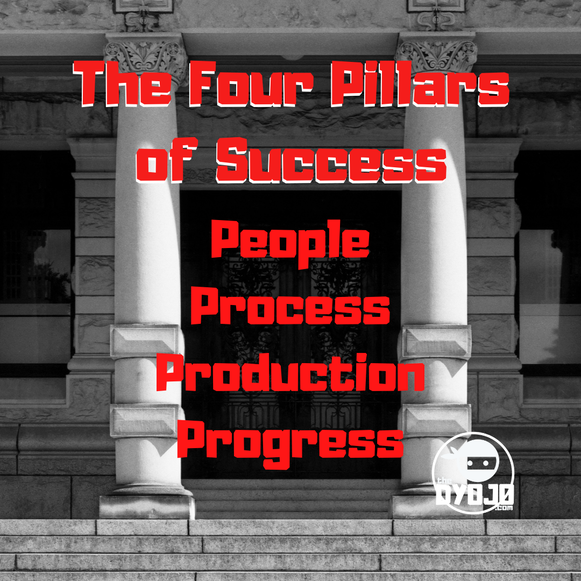The Four Pillars (The 4 P's) of Success
The DYOJO The Four Pillars (The Four P's) of Success for Service Based Organizations
At the DYOJO we believe in the 4 P's (pillars) of Success:
Jon Isaacson has developed a dynamic presentation on how managers, teams, and organizations can build and enhance these four universal pillars of competitive success in any market. As a person in a position of leadership, it is important to assess and update your mindset and habits so that you can best lead yourself, your team, and your organization.
At the DYOJO we believe in the 4 P's (pillars) of Success:
- People
- Process
- Production
- Progress
Jon Isaacson has developed a dynamic presentation on how managers, teams, and organizations can build and enhance these four universal pillars of competitive success in any market. As a person in a position of leadership, it is important to assess and update your mindset and habits so that you can best lead yourself, your team, and your organization.
- Your mindset affects your habits
- Your habits affect your production
- Your production affects your progress
- Your progress affects your mindset
Pillar of Success #1: People
Marion Wade, the founder of the now billion dollar company ServiceMaster, said,
“Don’t expect to build a super company with super people. You must build a great company with ordinary people.”
We will spend a good amount of time distinguishing between the ladder mindset, which plagues so many people in a position of leadership and organizations; and the mountain mindset. In doing so we will work to expand our perspectives of what is possible as we, "build a great company with ordinary people."
When people in a position of leadership adapt to a mountain mindset and habits they:
Marion Wade, the founder of the now billion dollar company ServiceMaster, said,
“Don’t expect to build a super company with super people. You must build a great company with ordinary people.”
We will spend a good amount of time distinguishing between the ladder mindset, which plagues so many people in a position of leadership and organizations; and the mountain mindset. In doing so we will work to expand our perspectives of what is possible as we, "build a great company with ordinary people."
When people in a position of leadership adapt to a mountain mindset and habits they:
- Develop a culture where there is an unlimited view of opportunities where team members embrace challenges together.
- Create a process where the best ideas flow throughout the organization as obstacles require that everyone works together to achieve progress in their shared big hairy audacious goals (BHAGs).
- Enhance collaboration and unlock creativity that will help the whole team to move the mission forward.
Pillar of Success #2: Process
In many ways process is synonymous with culture. Culture is what you are. Defining your culture is defining what you, your team, and your organization do. I have started departments, built teams, torn them down, and spent my career dedicated to making organizations better. I enjoy identifying underlying issues that are undermining progress and working to find creative solutions to solve them so that you can enhance your process.
Developing your culture comes down to those decisions that either enhance what you are building or undermine what you have been saying.
People in a position of leadership are responsible for:
Team members must learn to:
In many ways process is synonymous with culture. Culture is what you are. Defining your culture is defining what you, your team, and your organization do. I have started departments, built teams, torn them down, and spent my career dedicated to making organizations better. I enjoy identifying underlying issues that are undermining progress and working to find creative solutions to solve them so that you can enhance your process.
Developing your culture comes down to those decisions that either enhance what you are building or undermine what you have been saying.
People in a position of leadership are responsible for:
- Clarity
- Consistency
- Accountability
Team members must learn to:
- Do It Right
- Do It Efficiently
- Do It Excellently
Pillar of Success #3: Production
Whether your primary business is products or services, we often hear about issues at the production level. When a customer is unhappy with our products or services, we tend to allow the blame to rest with the end line employees rather than digging into the root causes of these dysfunctions.
In the vein of consistent improvement, there is a challenging quote comes from one of the most respected coaches of all sports, Hall of Famer Vince Lombardi. If you aren’t aware of Mr. Lombardi or his impact, the trophy they hand out to the winner of the super bowl each year is titled the Lombardi Trophy.
“Perfection is not attainable. But if we chase perfection, we can catch excellence.”
When we have the right people in our organization, working in the roles and responsibilities that best reflect their unique abilities (Good to Great) and we have developed a process that empowers our team to consistently produce at a high level, we enhance our production. I know I have not achieved perfection. I have had glimpses of “catching excellence” with several teams of ordinary people. Many of these principles are included in my upcoming second book, Be Intentional: Culture.
Whether your primary business is products or services, we often hear about issues at the production level. When a customer is unhappy with our products or services, we tend to allow the blame to rest with the end line employees rather than digging into the root causes of these dysfunctions.
In the vein of consistent improvement, there is a challenging quote comes from one of the most respected coaches of all sports, Hall of Famer Vince Lombardi. If you aren’t aware of Mr. Lombardi or his impact, the trophy they hand out to the winner of the super bowl each year is titled the Lombardi Trophy.
“Perfection is not attainable. But if we chase perfection, we can catch excellence.”
When we have the right people in our organization, working in the roles and responsibilities that best reflect their unique abilities (Good to Great) and we have developed a process that empowers our team to consistently produce at a high level, we enhance our production. I know I have not achieved perfection. I have had glimpses of “catching excellence” with several teams of ordinary people. Many of these principles are included in my upcoming second book, Be Intentional: Culture.
Pillar of Success #4: Progress
My friend, Idan Shpizear, who is the CEO of one of the fastest scaling property restoration franchises in the United States, was a recent guest on The DYOJO Podcast. During our discussion, he shared his process for setting and achieving your vision,
“Often we OVER estimate what we can accomplish in ONE year, but UNDER estimate what we can achieve in FIVE to TEN years.”
He is not the author of this prescient quote, but he has proven this concept as he has taken his business, 911 Restoration, from lugging around a portable carpet cleaner in an undersized 1978 Volvo with 100,000 miles on it to a company grossing over $50 million in 2015.
We talk about the contrast between the ladder mindset and the mountain mindset, which will help you, your team and your organization to update your perspective, challenge yourselves to achieve, and empower you to work collaboratively.
My friend, Idan Shpizear, who is the CEO of one of the fastest scaling property restoration franchises in the United States, was a recent guest on The DYOJO Podcast. During our discussion, he shared his process for setting and achieving your vision,
“Often we OVER estimate what we can accomplish in ONE year, but UNDER estimate what we can achieve in FIVE to TEN years.”
He is not the author of this prescient quote, but he has proven this concept as he has taken his business, 911 Restoration, from lugging around a portable carpet cleaner in an undersized 1978 Volvo with 100,000 miles on it to a company grossing over $50 million in 2015.
We talk about the contrast between the ladder mindset and the mountain mindset, which will help you, your team and your organization to update your perspective, challenge yourselves to achieve, and empower you to work collaboratively.
The DYOJO Way: developing Intentional Restorers at every level:
- Career development for property restoration technicians
- Leadership skills development for property restoration managers
- Estimating and project management best practices for estimators
- Process improvement for property restoration owners


